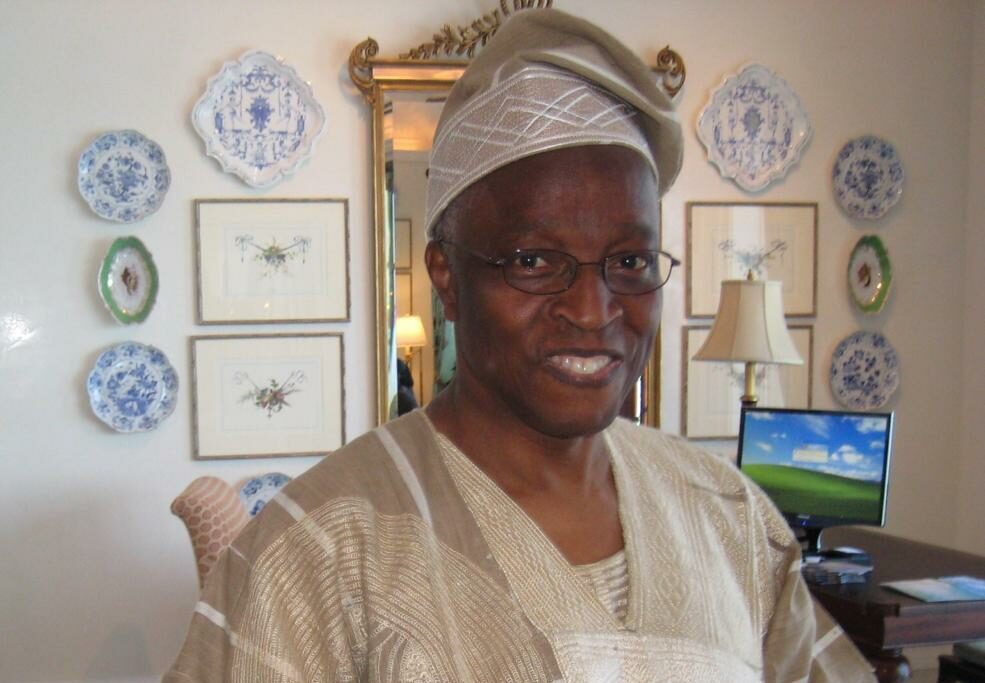A leading scholar on political and administrative management in Africa, Ladipo Adamolekun, has lamented the state of the Nigerian nation and called for an urgent review of the current situation of the country.
In his recently launched book, ‘Nigeria and I: Getting Politics Right To Make Nigeria Work,’ the scholar highlighted the operation of unitary federalism inherited from the military at the return to civilian rule in 1999 as a major reason Nigeria is not working.
The book, launched on 20th July to commemorate his 80th birthday, is one in a series of publications by the author which raised issues on how to address the problems of the country.
The Professor of Public Administration identified three critical ingredients for getting politics right and making the country work.
According to him, “a devolved federation; good democratic practice; and administrative competence,” are key to reviving the country.
He also recommended a development-oriented political leadership to serve as the needed drive in securing a renaissance for the country.
“To enhance our chances of keeping Nigeria one, consolidating democracy, tackling insecurity effectively, and achieving accelerated socioeconomic progress, Nigeria needs to urgently adopt and function as a devolved federal system,” he said.
“This political system will have the following defining characteristics: six federating units; assignment of functions between the central government and the federating units based on the principle of subsidiarity similar, to a considerable extent, to the assignment of functions in the country’s 1963 Constitution; and allocation of resources that is consistent with both the imperative of fiscal federalism and the proposed increased functions for subnational governments.”
On his second recommendation, Mr Adamolekun said Nigeria’s current poor scores concerning key measures of good democratic practice needed to be reversed.

“Specifically, improvements are required concerning electoral legitimacy (ensuring free, fair, and transparent elections), functioning of the party system, scope of political participation, respect for the rule of law, protection of human rights, and freedom of speech and association,” he said.
” The goal should be to ensure the legitimacy of governments and a functioning law-based state that would help promote accountable governance.”
On the third point, he noted that the country’s lack of administrative competence which is largely responsible for poor service delivery to the citizens since 1999 was recently acknowledged by incumbent President Buhari in his Independence Day speech on 1st October 2021.
“Finally, Nigeria needs a development-oriented political leader, one under whose watch the country can begin to record steady progress in growing the economy, reducing poverty, assuring security, and moving towards prosperity for all the citizens,” said Mr Adamolekun.
“This would be a leader who, at the end of his/her tenure, would be competitive for the Mo Ibrahim Africa Leadership Prize that was established in 2007.
“The Prize ‘recognises and celebrates African leaders who have developed their countries, lifted people out of poverty and paved the way for sustainable and equitable prosperity.’
“To the imperative of development-orientation, I would add four essential leadership attributes to the characteristics of the political leaders that would make Nigeria work: integrity, intelligence, competence, and vision.
“Whilst maintenance of the good practice of producing political leaders through the ballot box must be maintained, political parties should, henceforth, agree not to adopt former military leaders as party leaders or as presidential/gubernatorial candidates.
“The two recycled military leaders who have served as presidents during the post-1999 era have demonstrated clearly that military culture trumps democratic culture; a ‘civilianized’ Nigerian military leader cannot be a democrat.”
Mr Adamolekun envisaged three possible future scenarios for the country, which are “maintenance of the status quo: muddling through until the country settles for either B or C below.

“Optimistic scenario: the country finds a viable path to achieving a federal democracy and economic prosperity.
“Pessimistic scenario: the dreaded “D” word – disintegration of the federation.”
He posited that to achieve the “Optimistic Scenario” it was important for political leaders at both the central and sub-national levels to adopt and implement a devolved federal system and commit, in word and in deed, to good democratic practice, combined with administrative competence.
The book reviewer, Wale Adebanwi, a Professor at the University of Pennsylvania, Philadelphia, USA, said the book is about the issue of meritocracy.
“There is a reason why the issue of meritocracy is at the centre of this book,” he submitted.
” I have called the title of my review, ‘The Problem with Meritocracy,’ because, while the author’s life and the era that produced him have shown the value of meritocracy, the author’s advocacy in this book, that is, about ‘getting politics right to make Nigeria work,’ was produced by what those who have been running Nigeria for a few decades now see as ‘the problem with meritocracy.’
“In fact, for them, meritocracy is not merely a ‘problem,’ it is a ‘threat’ to their interests. And this, for me, is why this compact book is highly valuable not just because of the solutions it advances, but also in terms of its succinct but searing diagnosis of the Nigerian crisis.”
Mr Adebanwi further asserted that the Adamolekun generation was a generation in which the overall social conditions were such that people could make excellent personal choices.
He said they also had all the incentives needed to excel anywhere in the world.
“And importantly, competition was encouraged not only structurally among the regions, but also among the citizens themselves in order to ensure that the best were in charge of the critical instruments of the social order – including the universities and public service, two of the key areas of our national life that the author has studied closely for almost six decades.”
He agreed with the author that without federalist practices, strong institutions, and an excellent bureaucracy, even the best-intentioned individuals cannot make Nigeria work.
Support PREMIUM TIMES’ journalism of integrity and credibility
Good journalism costs a lot of money. Yet only good journalism can ensure the possibility of a good society, an accountable democracy, and a transparent government.
For continued free access to the best investigative journalism in the country we ask you to consider making a modest support to this noble endeavour.
By contributing to PREMIUM TIMES, you are helping to sustain a journalism of relevance and ensuring it remains free and available to all.
Donate
TEXT AD: Call Willie – +2348098788999

(function() {
var _fbq = window._fbq || (window._fbq = []);
if (!_fbq.loaded) {
var fbds = document.createElement(‘script’);
fbds.async = true;
fbds.src = ‘//connect.facebook.net/en_US/fbds.js’;
var s = document.getElementsByTagName(‘script’)[0];
s.parentNode.insertBefore(fbds, s);
_fbq.loaded = true;
}
_fbq.push([‘addPixelId’, ‘756614861070731’]);
})();
window._fbq = window._fbq || [];
window._fbq.push([‘track’, ‘PixelInitialized’, {}]);
!function(f,b,e,v,n,t,s){if(f.fbq)return;n=f.fbq=function(){n.callMethod?
n.callMethod.apply(n,arguments):n.queue.push(arguments)};if(!f._fbq)f._fbq=n;
n.push=n;n.loaded=!0;n.version=’2.0′;n.queue=[];t=b.createElement(e);t.async=!0;
t.src=v;s=b.getElementsByTagName(e)[0];s.parentNode.insertBefore(t,s)}(window,
document,’script’,’https://connect.facebook.net/en_US/fbevents.js’);
(function(d, s, id) { var js, fjs = d.getElementsByTagName(s)[0]; if (d.getElementById(id)) return; js = d.createElement(s); js.id = id; js.src = ‘https://connect.facebook.net/en_GB/sdk.js#xfbml=1&appId=249643311490&version=v2.3’; fjs.parentNode.insertBefore(js, fjs); }(document, ‘script’, ‘facebook-jssdk’));


